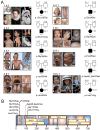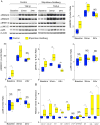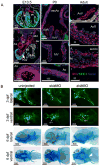Mutations in the TGF-β repressor SKI cause Shprintzen-Goldberg syndrome with aortic aneurysm
- PMID: 23023332
- PMCID: PMC3545695
- DOI: 10.1038/ng.2421
Mutations in the TGF-β repressor SKI cause Shprintzen-Goldberg syndrome with aortic aneurysm
Abstract
Elevated transforming growth factor (TGF)-β signaling has been implicated in the pathogenesis of syndromic presentations of aortic aneurysm, including Marfan syndrome (MFS) and Loeys-Dietz syndrome (LDS). However, the location and character of many of the causal mutations in LDS intuitively imply diminished TGF-β signaling. Taken together, these data have engendered controversy regarding the specific role of TGF-β in disease pathogenesis. Shprintzen-Goldberg syndrome (SGS) has considerable phenotypic overlap with MFS and LDS, including aortic aneurysm. We identified causative variation in ten individuals with SGS in the proto-oncogene SKI, a known repressor of TGF-β activity. Cultured dermal fibroblasts from affected individuals showed enhanced activation of TGF-β signaling cascades and higher expression of TGF-β-responsive genes relative to control cells. Morpholino-induced silencing of SKI paralogs in zebrafish recapitulated abnormalities seen in humans with SGS. These data support the conclusions that increased TGF-β signaling is the mechanism underlying SGS and that high signaling contributes to multiple syndromic presentations of aortic aneurysm.
Figures



Comment in
-
Aberrant TGF-β signaling underlies the pathogenesis of aortic aneurysm in Shprintzen-Goldberg syndrome.Clin Genet. 2013 Apr;83(4):318-9. doi: 10.1111/cge.12102. Clin Genet. 2013. PMID: 23330586 No abstract available.
References
-
- Dietz HC, et al. Marfan syndrome caused by a recurrent de novo missense mutation in the fibrillin gene. Nature. 1991;352:337–339. - PubMed
-
- Loeys BL, et al. A syndrome of altered cardiovascular, craniofacial, neurocognitive and skeletal development caused by mutations in TGFBR1 or TGFBR2. Nat Genet. 2005;37:275–281. - PubMed
-
- Loeys BL, et al. Aneurysm syndromes caused by mutations in the TGF-beta receptor. N Engl J Med. 2006;355:788–798. - PubMed
Publication types
MeSH terms
Substances
Supplementary concepts
Grants and funding
- G9521010/MRC_/Medical Research Council/United Kingdom
- T32 GM007814/GM/NIGMS NIH HHS/United States
- U54 HG006542/HG/NHGRI NIH HHS/United States
- R01 GM099321/GM/NIGMS NIH HHS/United States
- HHMI/Howard Hughes Medical Institute/United States
- 1R01HL111267/HL/NHLBI NIH HHS/United States
- 1U54HG006542/HG/NHGRI NIH HHS/United States
- K08 HL107738/HL/NHLBI NIH HHS/United States
- P01-AR049698/AR/NIAMS NIH HHS/United States
- G0600237/MRC_/Medical Research Council/United Kingdom
- R01 HL111267/HL/NHLBI NIH HHS/United States
- R01 AR041135/AR/NIAMS NIH HHS/United States
- P01 AR049698/AR/NIAMS NIH HHS/United States
- R01-AR41135/AR/NIAMS NIH HHS/United States
- K08 HL107738-01/HL/NHLBI NIH HHS/United States
LinkOut - more resources
Full Text Sources
Other Literature Sources
Medical
Molecular Biology Databases

